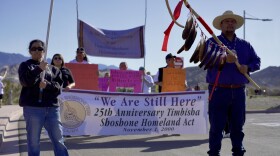Clark County spans more than 5 million acres. And while that may seem like a lot, the county says it will run out of land to develop in eight to 10 years. Adding to the problem: Clark County is locked in by federal land.
County officials have developed a plan that they say balances the need for growth with that of conservation. They also say it reduces climate impacts and addresses the area’s affordable housing shortage.
The conservation community is divided on the plan, with some hailing it as a win-win and others decrying it as a giveaway to developers.
Marci Henson is the director of the Clark County Department of Air Quality. She was tapped to create the plan because of her extensive experience in land planning.
She told KNPR's State of Nevada the plan allows more federal land within Clark County to be sold off to developers. The underlying idea is to spur economic economic development by opening up land along I-15 between Sloan and Jean.
Henson said the decision was based on an analysis of the kinds of businesses Southern Nevada wants to attract to diversify the economy.
"The fact of the matter is the analysis revealed that we don't have the assemblage of parcels in the right areas along transportation corridors in Southern Nevada in the valley," she said, "And hence, why we made a very tailored and specific request to expand south along I-15 corridor, east of the 15 from Sloan to Jean."
However, opponents of the plan say it will encourage urban sprawl. One of those opponents is Patrick Donnelly, the Nevada state director for the Center for Biological Diversity. He said the new land plan allows the city to grow beyond the valley's natural boundaries.
"This plan will allow Las Vegas to sprawl outside the Las Vegas Valley," he said. "Twenty years ago, a boundary was drawn around the city called the Southern Nevada Public Lands Management Act growth boundary, and that boundary was intended to keep us within the Las Vegas Valley. Now, 20 years later, the county wants another bite at the apple to expand that boundary and allow, ultimately, Las Vegas to sprawl all the way down to the California border along I-15."
Donnelly said the county didn't try to ask or answer the question: "What will our community look like 20, 40 years from now?"
County Commissioner Justin Jones disagreed with Donnelly's appraisal of the proposed land bill.
"This bill would simply expand the boundaries by which the county can authorize land to be disposed of," he said, "It doesn't mean that by expanding the boundaries, that those parcels are automatically sold off or available to developers."
He pointed out that the county commission still has a say in what goes up for sale and what can be developed on the land.
Jones also noted the county has talked with conservation groups and made changes to the plan based on their recommendations. One of the most significant was a change to the language that specifically said the bill did not apply to a controversial water pipeline that would bring water from eastern Nevada to Southern Nevada.
Donnelly agreed the county did consult with his group and others about the plan; however, he noted that consulting is not consenting.
"I would say all of our suggestions, even language we suggested for the bill, has been rejected," he said, "But I think we need to look at who has an influence in this process, and to do so, we need to look at who is paying for our county commissioners to be elected."
Donnelly said that both Marilyn Kirkpatrick and Justin Jones received campaign contributions from developers. He didn't suggest there had been a quid pro quo, but did note that he believes money has influence in politics.
Jones said he received campaign money from developers but also pointed out that he got funding and other campaign support from conservation groups as well.
"I definitely take offense at even the suggestion that somehow my decisions have been the result of a quid pro quo with any developer," he said.
The commissioner also said that the plan is now in the hands of the state's congressional delegation, and concerned parties can go to the representatives and senators to express their opinions.
Another group that has reservations about the plan is the Nature Conservancy. Jaina Moan, its director of external affairs, told KNPR's State of Nevada that while public land bills like this one are important, there needs to be a larger discussion about the impact they have on climate change.
"Looking to the future, I don't see a larger vision for how this will all fit together to achieve the climate goals that we need to achieve," Moan said.
She said at some point in time the city needs to start growing up and not out.
"There are many models across the country that have looked at how this type of development can occur and be very prosperous and (promote) economic development and entrepreneurialism," she said, "I think we just need to remember that we all breathe the consequences of decisions we make on conservation development, and this starts with this fundamental framework for a public lands bill."
For his part, Jones said the county is working on projects to fill in empty land already within the county limits but there are often barriers to that development like current zoning, absentee owners, and rules for auctioning off the land.
He also said the county is working on climate action plan, but a public land bill can't wrap up every issue Southern Nevada is facing.
From Desert Companion: Shifting Lands
Marci Henson, director, Clark County Department of Air Quality; Justin Jones, commissioner, Clark County Commission; Patrick Donnelly, Nevada State Director, Center for Biological Diversity; Jaina Moan, External Affairs Director, The Nature Conservancy











